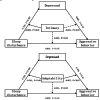The relationship between sleep disturbance and aggressive behaviour among community-dwelling schizophrenia patients: a moderated mesomeric effect model
- PMID: 38879495
- PMCID: PMC11179300
- DOI: 10.1186/s12889-024-19090-9
The relationship between sleep disturbance and aggressive behaviour among community-dwelling schizophrenia patients: a moderated mesomeric effect model
Abstract
Objective: Sleep disturbance is the most common concern of patients with schizophrenia and can lead to a poor prognosis, a low survival rate and aggressive behaviour, posing a significant threat to social security and stability. The aim of this study was to explore the mediating role of depression in the relationship between sleep disturbance and aggressive behaviour in people with schizophrenia living in the community, as well as the regulatory role of family intimacy and adaptability. These findings, in turn, may provide a theoretical basis and constructive suggestions for addressing the physical and mental health problems of these patients.
Method: From September 2020 to August 2021, a convenience sampling method was used to select schizophrenia patients from the community attending follow-up appointments at the Fourth People's Hospital of Pengzhou City, China. The researchers conducted a survey in the form of a star questionnaire. The survey included questions about general demographic data and disease-related questionnaires: the Pittsburgh Sleep Quality Index (PSQI), the revised Chinese version of the Modified Over Aggression Scale (MOAS), the Self-Rating Depression Scale (SDS), and the Family Adaptability and Cohesion Scale, Second Edition. FACES-II and SPSS 21.0 were used to organize and analyse the data.
Results: A total of 818 schizophrenia patients living in the community participated in the survey, and 785 valid questionnaires were ultimately collected, for a response rate of 95.97%. The results of multivariate analysis indicated that sex, number of psychiatric medications used, outpatient follow-up, history of hospitalization for mental disorders and sleep disturbances were factors influencing aggressive behaviour. Depression played a partial mediating role between sleep disturbance and aggressive behaviour, and the indirect effect size was 0.043 (57.33% of the total). In addition to sleep disturbance, family intimacy (β=-0.009, P < 0.01) and adaptability (β=-0.145, P < 0.001) can significantly predict depression.
Conclusion: The findings indicate that sleep disturbance in schizophrenia patients in the community is a risk factor for aggressive behaviour, and depression plays a partial mediating role in the relationship among sleep disturbance, aggressive behaviour and family intimacy. In addition, adaptability plays a regulatory role in the relationship between depression and sleep disturbance.
Keywords: Aggressive behaviour; Depressed; Schizophrenia; Sleep disturbance.
© 2024. The Author(s).
Conflict of interest statement
The authors declare no competing interests.
Figures




References
Publication types
MeSH terms
Grants and funding
LinkOut - more resources
Full Text Sources
Medical

